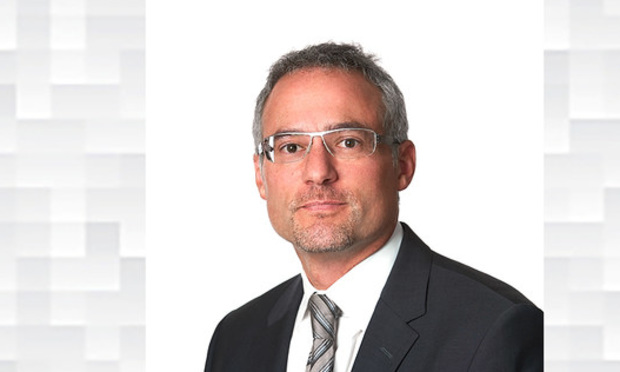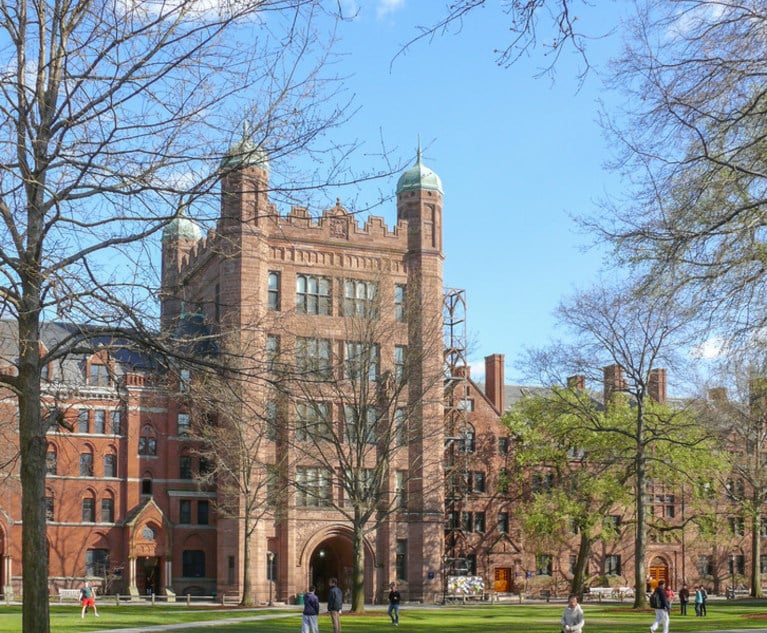State and Federal Suits Allege Decade of Abuse of Middletown Psych Patient
Two lawsuits have been filed on behalf of an institutionalized mentally ill man claiming years of emotional and physical abuse by staff. The suits seek monetary damages.
March 05, 2018 at 04:24 PM
5 minute read

The brother of a psychiatric patient who claims he underwent a decade of physical and psychological abuse while in state care has launched lawsuits in state and federal court.
Plaintiff Albert Shehadi's brother William Shehadi, 59, has been institutionalized since being found not guilty by reason of insanity for killing their father in 1995. In testimony that has shocked the state, it is alleged staff members at Connecticut Valley Hospital repeatedly kicked, hit and taunted William Shehadi, resulting in the arrests of 10 staff members and calls for reforms to state policies.
The lawsuits, filed in Bridgeport Superior Court and U.S. District Court in Bridgeport, allege Shehadi was repeatedly abused by dozens of employees in psychiatric care at the CVH while others failed to take steps to prevent the abuse. Antonio Ponvert III led a 30-minute press conference at the law offices of Koskoff Koskoff & Bieder in Bridgeport Thursday, attended by Albert Shehadi.
The lawsuits allege more than 200 acts of abuse, many of which were videotaped. Those acts were described in detail in the lawsuits, during the press conference and during testimony in the Legislature last November. In total, 33 staff members testified at hearings in the Legislature.
Allegations of abuse are supported by a videotape recording of a male nurse gyrating his groin in Shehadi's face and individuals dousing him with liquids, throwing food at him, and forcing him to wear a diaper on his head. Other examples of alleged abuse included one treatment specialist who allegedly repeatedly threw food at Shehadi and spit food on his shirt, bed and pants while other staff watched and did nothing. Another employee allegedly replaced Shehadi's lotion and shampoo with hand sanitizer, dumped salt in his coffee and contaminated his food with hot sauce, according to the complaint.
The scandal led to the suspension of about 35 workers. In addition, 10 were arrested and charged with cruelty and disorderly conduct.
The alleged abuse was denounced soon after it came out by Gov. Dannel P. Malloy, state politicians from both parties and Department of Mental Health and Addiction Services Commissioner Miriam Delphin-Rittmon. Malloy told news outlets he was “very disappointed” that “no one brought” the abuse to the commissioner's attention. The governor has repeatedly stood by the commissioner.
“I think, quite frankly, the commissioner is doing a good job and brought this to light and has cooperated in what has been the prosecution of people who were clearly breaking the law and they should be held accountable,” Malloy said at the time.
In public statements, the federal suit continues, Delphin-Rittmon called the apparent abuse “reprehensible” and “appalling.”
“We never thought the people arrested would be capable of doing what they did,” DMHAS Chief Operating Officer Paul Dileo told the Hartford Courant. “After seeing that, we took these other, extraordinary steps. We view [cameras] as one tool to ensure patient safety and to try to change the culture at Whiting.”
Ponvert said Friday the case is being followed by authorities, mental health specialists and the federal government. “The public health commission of the Legislature is interested in the outcome of this case, as is the State's Attorney's Office, the State Police and the federal government,” he said, noting that the 247-bed facility receives federal funding.
“My clients have a unique power to obtain justice and make changes.” Ponvert said, adding, “We have subpoena power and the force of the U.S. Constitution and Connecticut law behind us.”
The cases claim violations of the U.S. Constitution and the Connecticut Patients' Bill of Rights and seek a financial settlement and injunctive relief. The injunctive relief, Ponvert said, in essence will compel the hospital and the DMHAS to comply with state law to keep William Shehadi safe from harm and ensure he receives proper medical care.
Ponvert said Shehadi has the right under the Fourteenth Amendment of the U.S. Constitution to liberty. “He has the liberty to be free from excessive force,” he said. The psychiatric section of the Patients' Bill of Rights states that those with mental illness in state institutions are entitled to basic rights of confinement. “It calls for every mentally ill person to get humane and dignified treatment and to be protected from harm,” Ponvert noted.
Ponvert said the lawsuit filed in state court, which has to be assigned a judge, had to be heard there because the Connecticut Patients' Bill of Rights was at play. The federal lawsuit, to be heard by Judge Warren Eginton, was filed in that court, Ponvert said, “because there are particular constitutional claims.”
Constitutional claims outlined in the federal suit include violation of the Fourteenth Amendment's guarantee of safe conditions of confinement and the right to be free from the use of excessive force by agents and employees of the state, pursuant to 42 U.S.C. §1983. The lawsuits claim William Shehadi's Fourteenth Amendment right to reasonable medical and mental health care and protection from harm were violated.
The case was brought to light last year by a whistleblower who worked at the facility. Ponvert said he does not know the name of the whistleblower, adding that Shehadi's brother approached him soon after the accusations came to light.
Attorneys from the Office of the Connecticut Attorney General will represent the state and the facility. Jaclyn Severance, director of communications for the Attorney General's Office, said Friday that the complaints are under review.
In January, Malloy signed an executive order that separates the maximum security Whiting Forensic Division from the CVH.
In a statement at the time, Malloy said, “Having these two facilities as distinct entities governed by their own policies, procedures, and staff will ensure that we can focus more directly on the changes needed to continue to improve the quality of care at Whiting.”
This content has been archived. It is available through our partners, LexisNexis® and Bloomberg Law.
To view this content, please continue to their sites.
Not a Lexis Subscriber?
Subscribe Now
Not a Bloomberg Law Subscriber?
Subscribe Now
NOT FOR REPRINT
© 2025 ALM Global, LLC, All Rights Reserved. Request academic re-use from www.copyright.com. All other uses, submit a request to [email protected]. For more information visit Asset & Logo Licensing.
You Might Like
View All
Discovery Seeks to Link Yale University to Doctor in Fertility Scandal
4 minute read
SEC Puts Beat Down on Ex-Wrestling CEO Vince McMahon for Not Reporting Settlements
3 minute read
Trending Stories
- 1'It's Not Going to Be Pretty': PayPal, Capital One Face Novel Class Actions Over 'Poaching' Commissions Owed Influencers
- 211th Circuit Rejects Trump's Emergency Request as DOJ Prepares to Release Special Counsel's Final Report
- 3Supreme Court Takes Up Challenge to ACA Task Force
- 4'Tragedy of Unspeakable Proportions:' Could Edison, DWP, Face Lawsuits Over LA Wildfires?
- 5Meta Pulls Plug on DEI Programs
Who Got The Work
Michael G. Bongiorno, Andrew Scott Dulberg and Elizabeth E. Driscoll from Wilmer Cutler Pickering Hale and Dorr have stepped in to represent Symbotic Inc., an A.I.-enabled technology platform that focuses on increasing supply chain efficiency, and other defendants in a pending shareholder derivative lawsuit. The case, filed Oct. 2 in Massachusetts District Court by the Brown Law Firm on behalf of Stephen Austen, accuses certain officers and directors of misleading investors in regard to Symbotic's potential for margin growth by failing to disclose that the company was not equipped to timely deploy its systems or manage expenses through project delays. The case, assigned to U.S. District Judge Nathaniel M. Gorton, is 1:24-cv-12522, Austen v. Cohen et al.
Who Got The Work
Edmund Polubinski and Marie Killmond of Davis Polk & Wardwell have entered appearances for data platform software development company MongoDB and other defendants in a pending shareholder derivative lawsuit. The action, filed Oct. 7 in New York Southern District Court by the Brown Law Firm, accuses the company's directors and/or officers of falsely expressing confidence in the company’s restructuring of its sales incentive plan and downplaying the severity of decreases in its upfront commitments. The case is 1:24-cv-07594, Roy v. Ittycheria et al.
Who Got The Work
Amy O. Bruchs and Kurt F. Ellison of Michael Best & Friedrich have entered appearances for Epic Systems Corp. in a pending employment discrimination lawsuit. The suit was filed Sept. 7 in Wisconsin Western District Court by Levine Eisberner LLC and Siri & Glimstad on behalf of a project manager who claims that he was wrongfully terminated after applying for a religious exemption to the defendant's COVID-19 vaccine mandate. The case, assigned to U.S. Magistrate Judge Anita Marie Boor, is 3:24-cv-00630, Secker, Nathan v. Epic Systems Corporation.
Who Got The Work
David X. Sullivan, Thomas J. Finn and Gregory A. Hall from McCarter & English have entered appearances for Sunrun Installation Services in a pending civil rights lawsuit. The complaint was filed Sept. 4 in Connecticut District Court by attorney Robert M. Berke on behalf of former employee George Edward Steins, who was arrested and charged with employing an unregistered home improvement salesperson. The complaint alleges that had Sunrun informed the Connecticut Department of Consumer Protection that the plaintiff's employment had ended in 2017 and that he no longer held Sunrun's home improvement contractor license, he would not have been hit with charges, which were dismissed in May 2024. The case, assigned to U.S. District Judge Jeffrey A. Meyer, is 3:24-cv-01423, Steins v. Sunrun, Inc. et al.
Who Got The Work
Greenberg Traurig shareholder Joshua L. Raskin has entered an appearance for boohoo.com UK Ltd. in a pending patent infringement lawsuit. The suit, filed Sept. 3 in Texas Eastern District Court by Rozier Hardt McDonough on behalf of Alto Dynamics, asserts five patents related to an online shopping platform. The case, assigned to U.S. District Judge Rodney Gilstrap, is 2:24-cv-00719, Alto Dynamics, LLC v. boohoo.com UK Limited.
Featured Firms
Law Offices of Gary Martin Hays & Associates, P.C.
(470) 294-1674
Law Offices of Mark E. Salomone
(857) 444-6468
Smith & Hassler
(713) 739-1250











